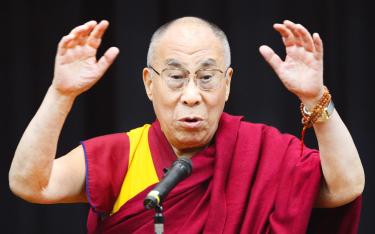Acting on the president’s instructions, the Ministry of Foreign Affairs has again denied a visa to Tibetan spiritual leader the Dalai Lama, who had been invited by an international group to attend its annual regional conference in Taipei next month, sparking outrage among various organizations in the country.
The Dalai Lama “is welcome to travel to Taiwan in due course. However, we need to arrange a more opportune time for his visit,” Minister of Foreign Affairs David Lin (林永樂) said in a letter, dated Friday last week, to Freda Miriklis, international president of the International Federation of Business and Professional Women (BPW International), the non-governmental organization behind the event.
In the letter, of which the Taipei Times obtained a copy, Lin said he was writing “on behalf of President Ma [Ying-jeou (馬英九)],” as Miriklis’ letters to Ma on Aug. 28 and Sept. 10 were forwarded to his ministry for reply.
According to BPW Taiwan, one of the 95 affiliates of BPW International, Miriklis requested that the president issue the Dalai Lama a visa because the organization had invited him to deliver a keynote speech at this year’s BPW Asia-Pacific Regional Conference in Taipei from Dec. 1 to Dec. 3.
Miriklis did not hear from the president on the matter until she received the letter from Lin, said BPW Taiwan, which is headed by former vice president Annette Lu (呂秀蓮).
The story came to light when the Chinese-language Apple Daily reported about it yesterday, prompting Democratic Progressive Party (DPP) lawmakers to demand an explanation from Vice Minister of Foreign Affairs Simon Ko (柯森耀) on why the Ma administration rejected the visa request.
Facing a barrage of questions from DPP legislators Tsai Huang-liang (蔡煌瑯) and Chiu Yi-ying (邱議瑩), Ko did not offer a reason, saying: “It’s not an opportune moment.”
At one point, Ko requested help from Joseph Ma (馬鍾麟), executive-general of the ministry’s NGO Affairs Committee, to answer the lawmakers’ questions.
Aside from saying that the decision not to issue the Dalai Lama a visa was made out of concern about “the nation’s overall interests,” Joseph Ma, who said his committee was assigned to deal with the case, offered no more explanation.
It is not the first time the Ma administration has barred the Dalai Lama from visiting Taiwan.
During a briefing with the Taiwan Foreign Correspondents’ Club on Dec. 3, 2008, President Ma said that while Taiwan generally welcomes religious leaders from all over the world, “I think at the current moment, the timing isn’t appropriate.”
“When will it be a proper time for the Dalai Lama to visit Taiwan? The timing was not right in 2009 [sic] and the timing is not right now. Do we have to wait until the Chinese Nationalist Party (KMT) is out of power? Is Taiwan still a country that values democracy, human rights and freedom?” Tsai asked.
The Dalai Lama was able to visit Taiwan, at the invitation of seven DPP mayors and commissioners, one month after Typhoon Morakot devastated southern parts of the country in August 2009, killing about 700 people and causing widespread damage.
Ma called an emergency meeting at the National Security Council to deliberate the case. The meeting lasted five hours before he approved the visit.
Chiu asked Ko to name the government officials who were involved in the decision, how they had assessed the case and why they considered the timing inappropriate for a visit by the Dalai Lama.
“I really can’t answer your questions here,” Ko said, adding that the ministry had made the decision pursuant to its authority.
The decision drew an angry response from various groups.
Taiwan Friends of Tibet president Chow Mei-li (周美里) panned the Ma administration for rejecting the visa.
“It’s obvious that the government refuses to issue a visa to the Dalai Lama because of the China factor,” Chow said by telephone. “It’s ridiculous that the government is already bending over even before China says anything — he [Ma] has lost direction.”
Chow said she could not imagine any other democratic nation would refuse the visit of a Nobel Prize laureate.
“Maybe what the minister of foreign affairs said was right: It is not the right time for the Dalai Lama to visit now; it would be a better time for His Holiness to visit after Ma steps down,” Chow said.
Speaking on the sidelines of a symposium in Taipei, US-based Chinese dissident and writer Chen Pokong (陳破空) also weighed in, saying the refusal was self-belittling and would harm the democratic values cherished by all Taiwanese.
“It is a great pity that Taiwan, which claims that it is a sovereign country, refused the Dalai Lama’s entry over fear of offending Beijing,” he said.
BPW Taiwan said the move reflected fear of angering China, which sees the exiled Tibetan spiritual leader as a separatist.
“We are angry as the government is obviously worried about China’s reaction. It’s ridiculous that Taiwan has to listen to China and seek its approval before doing anything,” a spokeswoman for Lu said.
The ministry denied China had anything to do with the decision.
“It’s just not a good time,” ministry spokesman Steve Hsia (夏季昌) said, declining to elaborate.
Source: Taipei Times - 2012/11/23





















